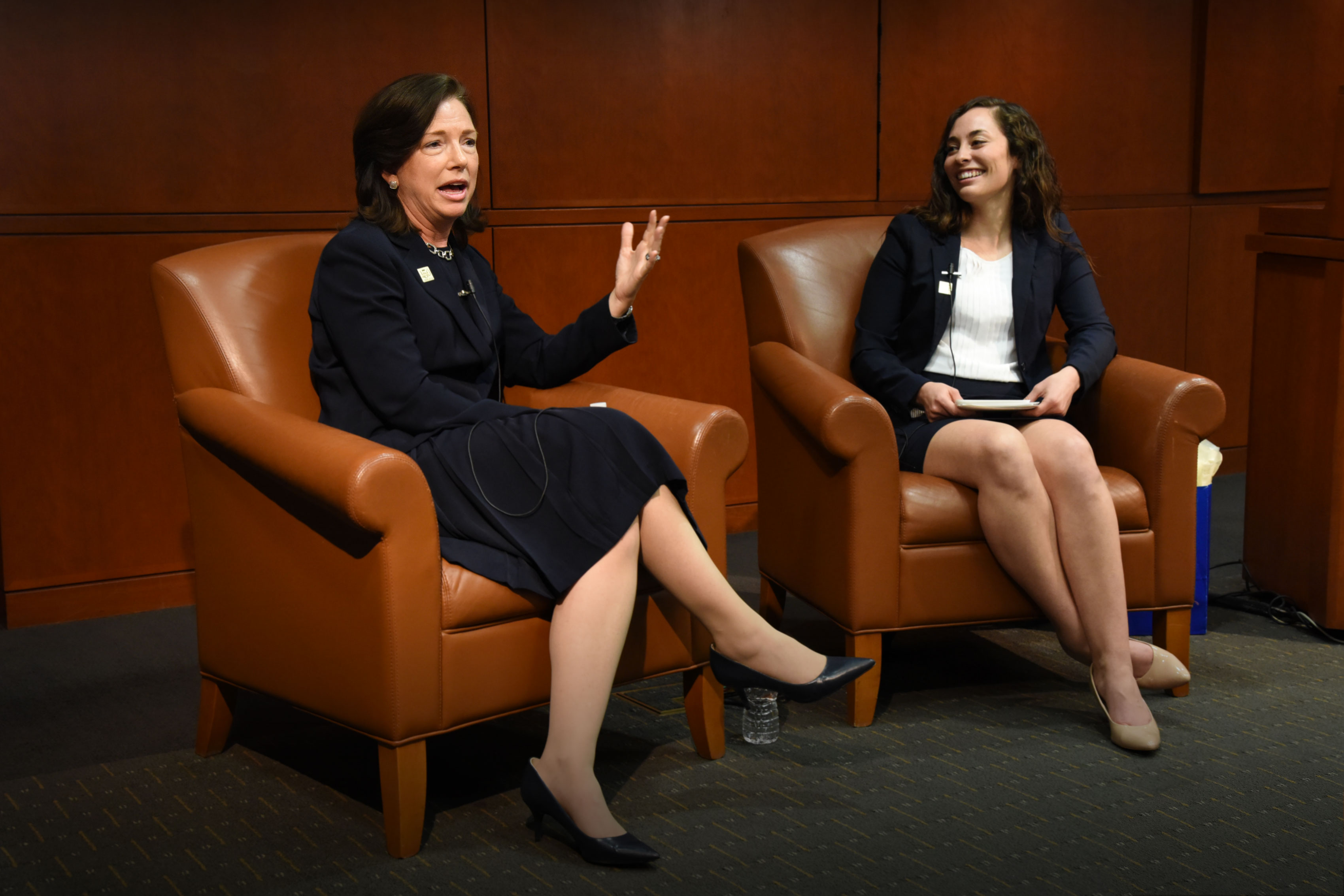GW Law celebrated women in the field of government contracts by hosting a discussion in late February with Barbara Humpton, President and CEO of Siemens Government Technologies and member of the GW Law Government Contracts Industry Advisory Board. During the event, which was sponsored by the Public Contract Law Journal in conjunction with the Government Contracts Student Association and the Law Association for Women at GW Law, a crowd enjoyed the discussion between moderator Aimee Rider, 3L, and Ms. Humpton as they examined the latter’s career journey from IBM to Lockheed Martin and Booz-Allen and eventually to the lead role at Siemens. Ms. Humpton recalled being drawn to government contracts work once she clearly understood its impact. “Early on, I learned that what we create is meaningful,” Ms. Humpton said of her early years at IBM. “The technology we put into place was used to save the life of a pilot shot down behind enemy lines. So my job affected the lives of families. It had real enduring power.”
Ms. Humpton noted the changes for women in the field that she has observed since the early 1980s when her career began. “Back then, I was literally called into smoke-filled rooms by a group of men to discuss work.” She recalled one male boss who suggested that she was taking the place of a deserving man who should have had her job. But much of her career growth was fostered by other women who served as her bosses, mentors, and peers.
The field of government contracting has been traditionally male, drawing from those already among the ranks of the military and defense communities. In addition, the majority of opportunities for educational focus in the field were available only to LLM students. As the numbers of women in the military and defense industries has increased and as more JD students have been exposed to the field, the number of women in government contracts has steadily increased.
GW Law’s program has had a notable impact on the field. As the oldest government contracts program in the country and the only one to offer an LLM degree, GW Law features specialized courses not given elsewhere, along with the opportunity to work on the Public Contract Law Journal and to earn academic credit in externships through our Field Placement Program.
In particular, the externship experience often serves as the lynchpin in capturing students’ attention toward the field, bridging the divide between theory and practice. Jessica Tillipman, Assistant Dean for Field Placement, is a perfect example. “Once I began practicing, I fell in love with government contracts,” she recalls. “It’s a subset of every practice: a subset of criminal law, mergers and acquisitions, labor and employment law, you name it. Government contracts touches on all practice areas. You don’t have to choose just one area of law.”
She speculates that the exposure to that breadth of law in action may be attracting more people to the field, and necessarily many of those are women. “Part of the appeal for women, in terms of GW, is that we have such prominent examples of successful female graduates in the field,” Dean Tillipman continues. Our graduates include Maria Swaby, LLM ’12, Suspension and Debarment Official, Government Services Agency; The Honorable Ruth C. Burg, JD ’50, Retired Administrative Judge, Armed Services Board of Contract Appeals; Beth A. Kelly, JD '89, Deputy Assistant General Counsel, U.S. Department of Energy; Karen L. Wilson, LLM ’82, Director of Acquisition Policy and Industrial Affairs, The Boeing Company; and Rebecca E. Pearson, LLM '96, Partner, Venable LLP, just to name a few.
Still, Ms. Humpton acknowledged that the field “has room to expand” in terms of recruiting women. Her advice to women interested in the field? “Women just need to get on with it,” she encouraged. “Raise your hand, step in, and do the job.”


